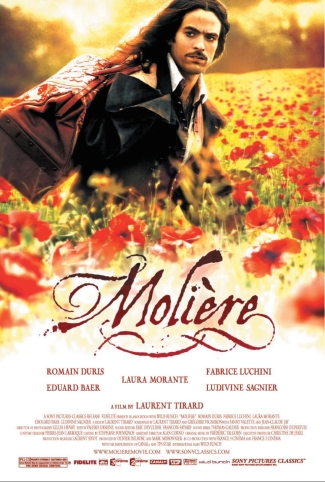
MOLIERE
France, 2007, 120 minutes, Colour.
Romain Duris, Fabrice Luchini, Laura Morante, Edouard Baer, Ludivine Sagnier.
Directed by Laurent Tirard.
Moliere is in the vein of Shakespeare in Love and Becoming Jane, films which speculate about the lives of famous authors. This film is done with the light touch, taking its cue from Moliere’s own treatment of society and individuals in his plays. Specifically, this film uses The Bourgeois Gentleman and Tartuffe.
The film is set in 1644 when Moliere disappears from history. The writer-director, Laurent Tirard, makes up a story where Moliere has a touring company, is in debt, is unsuccessful in putting on plays, goes to debtors’ prison. He has an affair which leads him to think more deeply about his writing and the need for satiric comedy. He also acquires a patron who pays off the debts, brings him to his home, asks him to be the tutor for his daughter whereas he really wants Moliere to write a play which will enable the nobleman to seduce a young woman.
These elements of the story come from Moliere’s own plays.
Romain Duris is Moliere, a rather unsubtle and flamboyant performance. On the other hand Fabrice Lucchini (so sinister in so many films) is the complex patron. Italian actress Laura Morante is the nobleman’s wife. Ludivine Sagnier is the object of his intentions and affections.
The film creates an atmosphere of 17th century France and gives some playful insights into Moliere’s career as well as his transition from actor to serious playwright observing the follies of French society.
1.Moliere? His reputation? Theatre, French literature? The 17th century? An innovator in drama? Language?
2.The production values, the re-creation of the 17th century, sumptuous, costumes and décor, locations, the French countryside, Paris, the theatre, the mansions, the salons? Audience response to the affluence, the colour? The musical score?
3.The introduction to Moliere himself, Romain Duris’ performance, its intensity? The troupe arriving in Paris, thirteen years on the road, the members of the troupe, going to the theatre, Moliere’s ambitions, wanting to write a tragedy, the arguments with the troupe, the arguments for comedy, going to see the king, the king’s demand for a comedy? His attempts to write, failure? The situation for the flashback?
4.Moliere as an actor when young, improvising, composing, farce? The performance on stage? With the two creditors? The audience laughing and applauding? As a tutor, learning, the experience, the story of Jourdain, Elmire? The influence on his career?
5.Moliere and the troupe, the characters, the creditors, the farce, Bonnefoy, getting him out of prison, his going to meet Monsieur Jourdain? The mystery, the explanation, the plan? Jourdain’s play? Moliere pretending to be a tutor, Tartuffe? Elmire, her despising him, the daughter and her geometry classes, poking out her tongue? The scepticism about religion? The older daughter and her suitor? The situation for future plays? Moliere and taking all these characters for the future, their words, actions, problems? Himself pretending to be Tartuffe?
6.Celimene and her salon, a precocious young woman, her wealth, wit and intelligence, the wordplay and the delight of the women in the salon?
7.Dorante as the go-between, as a character, wooing Celimene, his lies to Jourdain, taking the jewels and keeping them? Flattering Jourdain? His own house, his needs, the possibility of getting money for cancelling his son’s wedding? His ambitions for his son, his not wanting to be thought of as a merchant? His background? His smooth talk to Jourdain about the play’s performance?
8.Moliere in the house, Jourdain taking his advice, the clashes with Elmire? His observations? Falling in love, her discovering the truth about him?
9.As the tutor, helping Jourdain with his performance, the return after the play, his contrived entrance to Celimene’s salon, Jourdain disguised as a woman, observing? Hearing the truth in her bitter speech? His own speech in reply – the speech about the donkey? The effect on Celimene?
10.Jourdain as wealthy, his infatuation with Celimene, his alienation from his wife? At home, the debtor and the money, his safe full of money? His wanting a title? Severity with his daughter, dismissing her suitor? His wife, seeing the daughter and his anger? The issue of the marriage, the discussions with Dorante and his son, the son and his not being like his father, dry business discussions? The issue of the piracy, the ransom? His anger, demanding that the wedding take place? His discovering his wife’s infidelity, his reaction?
11.The pirate story, Elmire and her performance, his belief, change when he saw his daughter?
12.Moliere, Elmire, the plan to leave, getting the money? Her performance for the pirate story?
13.Jourdain discovering his wife’s infidelity, hearing the sounds, his fall? Moliere and his questions – admission of guilt, a plan for helping the situation? Jourdain accepting it?
14.The wedding, the improvising to save the daughter, the performance, Bonnefoy and the news about the warehouses burning, Dorante and his hesitation, taking his son away?
15.The farewell to Elmire? His saving the marriage? His saving Jourdain?
16.The return to the troupe, the coming to the present, writing the play, the success, the applause of the king, the laughter? Going to Elmire, her death, the forgiveness? His tears? Tears at the play?
17.A portrait of the playwright, part fiction, part truth? A genius in his times?